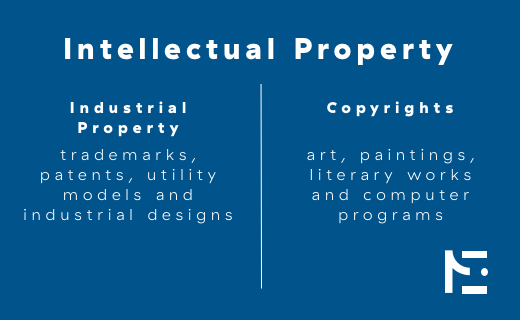Intellectual Property is the sum of the rights that the state grants to human creations, either artistic or industrial, as well as the recognition of the holder’s authorship and of his exclusive right to obtain economic benefit from those rights.
Intellectual property can be defined as “the exclusive rights granted by the State over creations of the human mind, in particular, inventions, literary and artistic works, distinctive signs and designs used in commerce.” As per this definition, we can observe that Intellectual Property is the genre term from which two branches emerge: Industrial Property and Copyright.
We may also observe this as stated in the Article 28, tenth paragraph, of the Constitution, in which the rights of authors, artists, and inventors regarding the production of their work and the sole use of their creations is stated.
“Privileges granted for a given period of time to authors and artists for them to produce their pieces of work and to inventors and those individuals who improve inventions will not be considered monopolies.”

Industrial Property.
As its name indicates, Industrial Property deals primarily with industry-related creations, defined by the State as that of mainly economical importance. As stated in the Industrial Property Law, the administrative authority in charge of industrial property is the Mexican Institute of Industrial Property (IMPI for its acronym in Spanish), whose responsibilities include:
Within Industrial Property, we will find patents, utility models, utility designs, brands, and commercial advertisements.
Copyrights.
On the other hand, Copyrights focus primarily on the artistic sector, and their regulation is responsibility of the Federal Law on Copyright, whose objective is to protect authors’, performers’, and editors’ rights concerning their literary or artistic works in all forms.
Copyrights are the State’s acknowledgment for the benefit of creators of literary and artistic creations, including the literary, musical, pictorial, sculptural, cinematographic, or even computer programs, among others.
The institute in charge of enforcing the Federal Law on Copyright is the National Copyright Institute (INDAUTOR for its acronym in Spanish), like the IMPI.
Registration of Rights before the IMPI and INDAUTOR
It is important to note that the IMPI and INDAUTOR offer different protection. Completing the register of an artistic work or of software before INDAUTOR results in the issuing of a copyright certificate acknowledging the authorship of the individual who created the work and of the individual who holds its property rights; the creator and the holder of property rights might or might not be the same person, and the certificate will lead to making public who has created the work and who is the property rights holder. Industrial property registration, on the other hand, results in the issuing of a trademark registration with constitutive effect, meaning that Industrial Property; a brand, commercial advertisement, or an invention is not yours until the State grants you the ownership by means of a Property Title; unlike the copyright certificate, which grants you ownership of your work from the moment of its creation and the State only provides you with acknowledgement of your authorship, issuing a document to demonstrate that there is not a similar work in their records and publicize it.
Due to the above, it is important to understand that, when dealing with Industrial Property, it is vital to carry out the registration before the IMPI in order to acquire property rights, so that in case a third party make use of your industrial property you have registered, you have the legal protection to ask him for a cease and dessist of the unauthorized used, to request royalty payment, or to submit a request before IMPI demanding them to enforce the cession of the third party’s unauthorized use.
When dealing with Copyrights, registration before INDAUTOR helps us in publicizing the work, as well as in granting it formality and authenticity by being able to attach the Copyright Certificate to the work.
The importance of knowing the differences between Industrial Property and Copyright is to know what we can register and the authority with whom we can go for advice in order to get the best protection for our artistic or industrial creation.